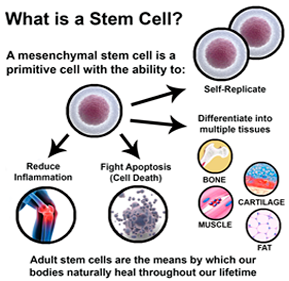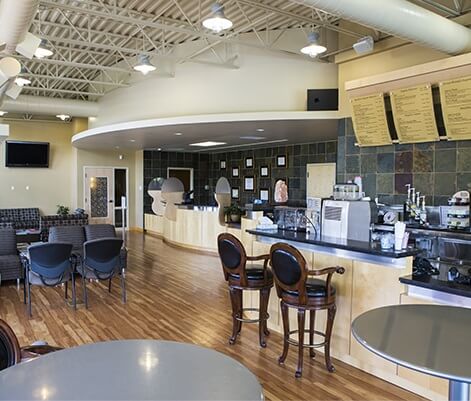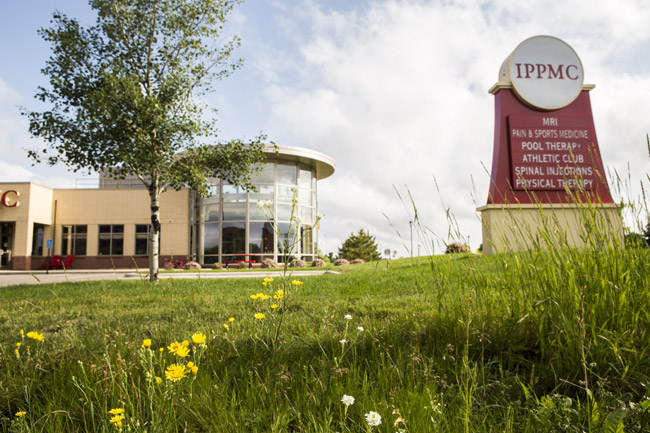Treating Pain with Stem Cell Therapy
Scientists and doctors have made tremendous advances to make tissue regeneration a reality in treating many diseases. Through regenerative medicine a person can take advantage of their body’s ability to heal itself by using the healthy adult stem cells that can be found throughout the body. Laboratory and clinical research has shown that it is possible to use adult stem cells to restore lost, damaged or aging cells and effectively regenerate tissue in the body thereby providing patients with an alternative to surgery for certain treatments or avoiding surgery all together.
Learn about treatment options at The Back Center- Schedule a consultation with our team!
What are Adult Stem Cells?
Adult stem cells were discovered over 40 years ago when researchers found that cells derived from adult bone marrow had the ability to form various tissues. Adult stem cells are an early stage cell and under the right conditions, are capable of developing into other types of cells with the potential to regenerate damaged tissue.

Adult Stem Cells can be used to treat many types of chronic pain and degeneration. Currently doctors are treating shoulder, knee, hip, and spine degeneration, in addition to soft tissue (muscle, tendon, ligament) and other bone related injuries.
New Section- Potential Conditions Treated
What are conditions can be treated with Adult Stem Cell Therapy?
Spine
The spine is comprised of both hard and soft tissues that work together to provide function and mobility to the body. Your spine is comprised of bone (vertebrae), cartilage-like discs, and muscle that support the weight of the body and protect the spinal cord and internal organs. If an area of the neck or back is injured, the entire structure begins to compensate for the injury causing a degradation in stability and function. Restoring stability and functionality by reducing your pain is possible when treating:
- Discogenic back pain
- Facet arthritis
- Bulging discs
- Degenerative disc disease.
Shoulder
Your shoulder is involved in small and large movements throughout the day. Shoulder injuries can result from the tiniest exertions like writing or driving a car. Frequently, a person might not even know they are suffering from a shoulder injury. If left untreated, the pain can become intolerable. Reducing or relieving this type of pain is possible when treating:
- Partial rotator cuff tears
- Labral tears
- Mild to moderate osteoarthritis
Hip
The hip joint is one of the most important joints in the human body. It allows us to walk, run, and jump. It bears our body’s weight and the force of the strong muscles of the hip and leg. The constant motion of walking, running, biking or climbing involves our hips.
The compression of these movements starts to wear on the joint over time. Reducing or relieving this type of pain is possible when treating:
- Mild to moderate osteoarthritis
- Labral tears
- Articular cartilage injuries
- Congenital deformities of the hip
Knee
The knee joint is a relatively complex anatomical structure. In addition, to a variety of ligaments that maintain stability and the presence of large muscle groups, the knee is used in almost all motion and over time will begin to degenerate from over use. During recreational exercise or competitive sports play, a combination of compressive, tensile, and torsional stresses are loaded onto the bones, articular cartilage, and ligaments that comprise the knee joint. Joint pain in the knee can be extremely painful and challenging for anyone. If left untreated, the pain can be intolerable. Reducing or relieving this type of pain is possible when treating:
- Mild to moderate osteoarthritis
- Partial ligament tears: ACL & PCL
- Partial meniscal tears
- Augmented ACL or PCL reconstruction
Foot & Ankle
The foot and ankle work together to provide support and mobility to the body. Injuries to the foot and ankle occur often. The constant pressures we cause with simple, line walking or stretching, often exasperate these injuries. Over time, we collect scars with these injuries making it difficult for our body to heal on its own. Reducing or relieving this type of pain is possible when treating:
- Mild to moderate osteoarthritis
- Tendon inflammation
- Partial achilles tendon tear
- Muscle strain/sprains.
New Section- Who is a candidate for stem cells?
WHO IS A CANDIDATE FOR A STEM CELL PROCEDURE?
The first step is to determine if you are a good candidate for an adult stem cell procedure. Your physician will want a history of your injury and a physical examination and may also need x-rays, and even an MRI. While stem cell therapy might be appropriate for certain conditions, it is not applicable for every condition. However, it has proven to be a viable option for patients suffering from pain. Good candidates for adult stem cell treatment usually are:
- A patient that wants to avoid the inherent complications that come with an invasive surgical procedure
- A pain sufferer that is interested in an option that offers potential for an overall improved quality of life
- Keep in mind that every patient is different, so success of a stem cell therapy will depend on the severity of your condition and your body’s response to stem cell therapy.
Learn about treatment options at The Back Center- Schedule a consultation with our team!
NEW SECTION- OVERVIEW OF THE PROCEDURE
OVERVIEW OF THE PROCEDURE
An adult stem cell procedure harnesses and amplifies the body’s natural mechanism for healing and anti-inflammation. Once you have been identified as a good candidate for the procedure, a member of our team will review the procedure with you and answer any questions that you may have. A brief overview of the procedure is below:
- This therapeutic approach uses adult autologous stem cells, which are obtained from your own bone marrow.
- In the procedure, the physician will aspirate these cells from your hip, concentrate them, and then deliver them back into your body in the area of damage or injury to aid in natural healing.
- Typically, the process takes less than 45 minutes and the concentration of aspirate cells takes about 12-14 minutes.
- Because your procedure will utilize a concentrated preparation of your own cells, the procedure is considered “autologous point-of-care”.
After the procedure is completed, our staff will allow you to rest, but before you leave the office the staff will create a customized personal rehabilitation program to support your recovery. We will either ask you to come back for a few post-operative appointments or follow up with you by phone, email, or mail so we can track your healing progress.
Frequently Asked Questions (FAQs)
Q: What is Regenerative Medicine?
A: Regenerative Medicine is a new and advancing clinical effort focused on the repair and regeneration of damaged tissue utilizing stem cells.
Q: What are adult stem cells?
A: Adult stem cells are unspecialized or undifferentiated cells, capable of two processes: self-renewal and differentiation. They are vital to maintaining tissues in the body such as internal organs, skin, and blood.
Q: Are there different types of adult stem cells?
A: Yes, there are many types of adult stem cells found in the body, which have variable differentiation potentials. The multipotent, mesenchymal stem cell (MSC) is one of the adult stem cells that supports the repair of damaged tissue.
Q: Where do adult stem cells come from?
A: In adults, stem cells are present within various tissues and organ systems, but the most accessible locations for MSCs are the bone marrow and adipose (fat) tissue.
Other sources include the liver, epidermis, retina, skeletal muscle, intestine, brain, placenta, umbilical cord and dental pulp.
Q: What is the difference between adult stem cells and embryonic stem cells?
A: Adult stem cells are found in mature adult tissues including bone marrow and fat, while embryonic stem cells (ESCs) are not found in the adult human body. ESCs are obtained from donated embryos provided during in vitro fertilization procedures, which raises many ethical concerns. Because ESCs are not autologous, there is a possibility of immune rejection. Adult stem cells do not raise ethical issues nor pose any risks for immune rejection.
Q: Does The Back Center use embryonic stem cells in clinical procedures?
A: No, The Back Center cell therapy relies only on autologous adult stem cells isolated from the patient during the therapeutic procedure. He does not participate in embryonic stem cell research or use embryonic stem cells in clinical applications.
Q: Are there ethical issues associated with harvesting adult stem cells?
A: No, adult stem cells do not raise ethical questions as they are harvested from the patient’s body.
Q: Are there cancer-causing risks associated with adult stem cell treatments?
A: No. While embryonic stem cells have been shown to form teratomas (germ cell tumors), there is no data that suggests adult stem cells have the same potential to promote the development of tumors. In fact, a recently published report showed that there was no risk for tumor formation at the site of autologous bone marrow concentrate injection in a study of 1,873 patients who were treated for orthopedic diseases with an average follow up of 12.5 years.
Q: How does The Back Center obtain adult stem cells for use in cell treatment?
A: The Back Center obtains the cell material by aspirating bone marrow from your hip bone during your therapeutic procedure.
Q: Are the harvested adult stem cells expanded in a laboratory setting prior to delivery back to the patient?
A: No, The Back Center does not use in vitro expansion. The bone marrow aspirate is obtained, placed in a sterile device, centrifuged and the adult stem cells are recovered, all of which happens close to the treatment room.
Q: How are adult stem cells used in therapeutic procedures?
A: Adult stem cells are used to treat patients with damaged tissues due to the aging process or trauma. During a procedure, stem cells are isolated from the patient, concentrated and delivered back to the site of injury to assist in the healing process.
Q: How do stem cells know what type of tissue to develop into?
A: The differentiation of stem cells is dependent on many factors, including cell signaling and micro-environmental signals. So, the stem cells are very sensitive to the micro-environment in which they are placed. Based on these cues, the stem cells will respond as appropriate, including the potential to develop into healthy tissue needed to repair damaged tissue. For example, multipotent stem cells delivered to damaged bone will promote the development of bone cells to aid in tissue repair.
Q: Will my body reject the stem cells?
A: No, since the cells are obtained from your body (autologous) and processed quickly at point-of-care, they will not be rejected.
Q: Is stem cell therapy safe?
A: Yes, and ask your doctor what clinical studies have been done to show that stem cells are safe and effective.
Q: How long will the stem cells last?
A: It will depend on your injury, the area that is treated and your response to the therapy.
Q: What is the difference between autologous and allogeneic cells?
A: Autologous cells are taken from the same patient, typically at point-of-care. Allogeneic cells are taken from a donor and often are manipulated before they are given to a patient.
Q: How much will it cost?
A: The cost of the stem cell portion of the therapy isn’t covered by insurance companies, so ask your doctor for payment options.
We guarantee the most cost effective pricing, save thousands of dollars compared to other resources.
Learn about treatment options at The Back Center- Schedule a consultation with our team!


